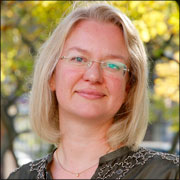Distinguished iNANO Lecture: Optical Manipulation and Bio-applications of Plasmonic Nanoparticles
Professor Lene Oddershede, Niels Bohr Institute, University of Copenhagen
Info about event
Time
Location
iNANO Auditorium (1593-012), Gustav Wieds Vej 14, 8000 Aarhus C

Professor Lene Oddershede, Niels Bohr Institute, Biocomplexity, Copenhagen UniversityOptical Manipulation and Bio-applications of Plasmonic Nanoparticles A tightly focused laser beam can trap and manipulate individual metallic nanoparticles both in liquid [1] and in air [2]. Not only the position, but also the orientation of a single nanoparticle can be controlled and a precise optical control of metallic nanoparticles has huge potential, e.g., for aerotaxy or nano-architectural purposes. Due to their plasmonic properties, metallic nanoparticles will absorb part of the incident light and the energy will be released as heat into their local surroundings. The heating associated with resonant irradiation of metallic nanoparticles can be extreme. Moreover, this heating of an irradiated nanoparticle cannot be theoretically predicted, as the precise focal intensity distribution on the nanoscale is unknown and typically highly aberrated [3]. We developed a novel membrane-based assay to directly quantify the temperature profile of an individual irradiated metallic nanoparticle and show how the temperature depends on laser power and particle size, shape, orientation and composition [4,5]. Laser induced heating of metallic nanoparticles can be advantageously used in a controlled manner, for instance to fuse membranes and cargos of two selected giant unilamellar vesicles [6]. Another promising application of these hot metallic nanoparticles is within cancer therapy, where novel results show that laser irradiated metallic nanoparticles can be used to mediate targeted drug delivery and for photothermal tumor treatment. [1] Hansen et al., Expanding the optical trapping range of gold nanoparticles, Nano Letters, vol. 5 p.1937-1942 (2005). | |
| Host: Associate professor Duncan Sutherland, Interdisciplinary Nanoscience Center, Aarhus University |
